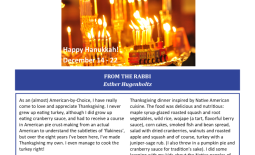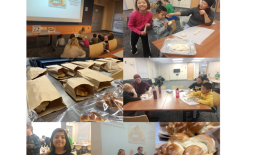The God of Becoming and Relationship
During this sacred month of Elul, as we turn our hearts inwards and turn our eyes to Tishrey, I must say that I have not felt the Presence of God.
There you go: I’ve said it. Despite my prayers and sacred practices, the tried-and-true spiritual technology that usually helps me into a contemplative and connected space, I have felt a barrenness in my soul. Perhaps it is the accumulated pain of the last number of years; perhaps it’s the stress of preparing for the High Holidays or being a busy rabbi and an exhausted parent, but I just haven’t felt that usual expansive, loving presence in my life.
And that’s okay.
God and I go way back – over thirty years – and these days, usually our relationship is pretty good and sometimes our relationship is a little bit complicated (we had a falling out for about seven years). Like any human relationship in our lives, it is a relationship in need of maintenance and repair, worthy of emotional investment and dependent on steady commitment. We may feel similarly in our human relationships: sometimes a marriage hits a rough patch or we need some distance from our parents or are exasperated by our children or lose touch with a friend. The evaluation that we need to undertake of our human relationships is exactly the sacred process we are meant to engage in during this season. If our human relationships hit roadblocks, then why not our relationship with God?
The paradox is that I get to speak freely and trustingly about when I don’t feel God in my life because I often do feel God’s presence in my life and it is the anchoring of Torah and mitzvot that helps us ground ourselves spiritually; that creates the conditions for what Rabbi Abraham Joshua Heschel would the Divine pathos and radical amazement. I trust that through the waxing and waning of my religiosity, my soul will always find her place home.
Now let’s take a few steps back.
Over the last few weeks, we have explored different theological angles. In the first sermon, we talked about the importance of ‘theological literacy’, that irrespective what our beliefs (or lack thereof) are, we are able to hold our own in the religious marketplace of ideas. The mark of a spiritually mature person is not necessarily what they believe but how they hold their position and extend grace to those who hold a different one. In last week’s sermon, we discussed the idea of monotheism as a guarantor of human rights and dignity; that even if we cannot confirm the experience or reality of God, that finding value in the symbology of God as a universal moral standard is still cogent and compelling.
This week, I want to talk about the relationality of God. Is it possible to shift the metaphor of God into experiencing the presence of God?
It’s important to use words carefully. There is a distinction to be made between a personal God and a relational God and this isn’t mere semantics. For many of us, affirming a belief in a personal God may be a very tall order. It is almost inevitable that the idea of a personal God comes with some theological baggage: is that God also interventionist? Omnipotent? Omniscient? Omnibenevolent? Does such a God imply a deterministic universe? Is this the God of Torah, Tanakh, Talmud? There are certainly Jewish theologies that affirm such a personal God and they can be thoughtful and sophisticated. Still, I think it is important to offer a more expansive theological landscape that offers us many pathways into the Divine.
A relational view of God invites dynamics and nuance without forsaking the yearnings of the heart. Some people favor the abstraction of intellectual contemplation. Others want to feel moved. Loved. Exalted. Overcome. Surprised. Delighted. Open to an experience that may hover between the improbable and possible; welcoming in love, fulfillment, integration, preparing to enter that blurry, undefined place between the promise and the reality—which is often where the magic happens. A relational approach to the Divine allows for us to turn our hearts with intentionality; to say ‘this matters and this open heart-space may lead me to new horizons’. It allows us to hone the skills of love, surrender and service. To bring to life the notion that ‘haMelech ba’Sadeh’, the ‘Monarch is in the field’ during this time. Relationality is about increased intimacy and creating healthy, nurturing conditions for such intimacy.
Taking that leap into transcendence can be extraordinarily hard; and it may not be desirable for every person. We honor the skeptics, the doubters, the agnostics and atheists in congregational life and welcome their gifts of critical inquiry. And we honor the mystics, the seekers and those of us who want to venture forth into that heart-space and experience God’s presence and God’s love. The High Holidays give us the instruments to do so.
I started out this sermon series with declaring that I love God. It is always hard to share the personal experience of spirituality because by its very nature, it feels private, even if the context in which we experience it is public.
I have felt God’s presence keenly during the last moments of Ne’ilah, when the synagogue is immersed in shadow and we inch closer to the final crescendo of Yom Kippur; the air thick with intention, expectation and yearning—where many of us are willing, if only for a moment, to suspend disbelief and be swept up in the magic of that hour.
I have experienced God in private prayer; praying through my tears as well as my joy; knowing – in that moment, at least – that I am held, grounded and loved.
The Divine lives in music and dance, art and physicality—the exuberance of the embodied lives we are privileged to live.
The Shechinah dwells in the study of sacred text or the performance of even the most mundane of mitzvot.
I have felt God’s presence in the grandeur of the natural world, like so many of us and even felt God in the cinematic dome of the Chicago Planetarium watching an animated movie about the origins of the cosmos. Risking sentimentality – feeling a tear sting in my eye.
Moreover, I have felt God made manifest in the relationships I have with my loved ones; the warmth of my children’s limbs wrapped around mine, the steady, abiding love of my spouse, the heartening affections and solidarity of friendship.
Inviting others into a spiritual encounter is tricky. It can feel forced or, God forbid, manipulative. No-one can walk anyone else’s path; ultimately, we all walk alone. But I am inspired by Rabbi Bradley Artson’s Process Theology (book recommendation: The God of Becoming and Relationship) where he conceives God as a series of loving, dynamic, inviting lures. He writes:
‘The cosmos is a partner with God in the becoming. We are partners with the cosmos and with God in our own becoming. We have agency; all creation has standing. The past is offered to us, and God meets us in this moment, as in this moment we come to be anew. In every moment we are coming into being again and again.’[i]
And:
‘One key shift then, for Process thinking, is that God does not exercise coercive power, God exercises persuasive power. Western people conceive of belief in God, and many concur – both believers and atheists – as affirming a bully in the sky who compels behavior or results from unwilling, passive agents, or who restrains behavior and precludes outcomes that sinning creatures would otherwise pursue. Process thinking dissents, reminding us that God does not work through coercion; God works through persuasion and invitation, through persistently inviting us to make the best possible choice, and then leaving us free to make the wrong choice. But then the instant we have made our choice, God persistently lures us toward the making of the best possible subsequent choice.’
It is possible to feel both religious passion alongside with nurturing critical inquiry. It is possible to embrace a sophisticated, living, breathing theology that invitees the experience as much as the questions. Not interventionism or determinism, but a quantum field of human and Divine possibility where we uncover both our own free will and the deep call of the Divine, however it sings in our heart.
We can find a spiritual roadmap in this week’s Haftarah which speaks deeply of this kind of intimacy, love and relationality:
‘Ki heharim yamushu v’hag’va’ot t’mutenah, v’chasdi me’iteich lo yamush uvrit sh’lomi lo tamut amar m’rachameich Adonai.’
‘For the mountains may move
And the hills be shaken,
But my loyalty shall never move from you,
Nor My covenant of friendship be shaken
—said the Eternal, who takes you back in love.’
- Isaiah 54:10
As we journey deeper into Elul and deeper into ourselves, may we unfold our unique and ever-changing connections and relationships to the Divine, however we understand it, and feel confident in the embrace of sacred community to be always surprised and delighted by what this beautiful, strange life has in store for us.
[i] http://www.newcaje.org/wp-content/uploads/2013/02/BA-Derekh-On-the-Way-A-presentation-of-Process-Theology-by-Rabbi-Bradley-Shavit-Artson.pdf




